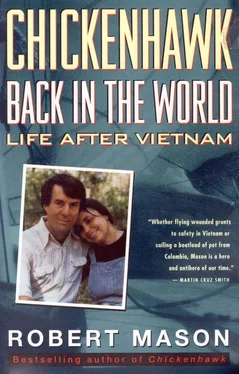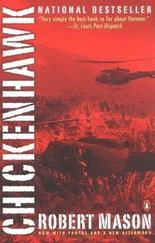Robert Mason - Chickenhawk - Back in the World - Life After Vietnam
Здесь есть возможность читать онлайн «Robert Mason - Chickenhawk - Back in the World - Life After Vietnam» весь текст электронной книги совершенно бесплатно (целиком полную версию без сокращений). В некоторых случаях можно слушать аудио, скачать через торрент в формате fb2 и присутствует краткое содержание. Год выпуска: 2013, Издательство: BookBaby, Жанр: Старинная литература, на английском языке. Описание произведения, (предисловие) а так же отзывы посетителей доступны на портале библиотеки ЛибКат.
- Название:Chickenhawk: Back in the World - Life After Vietnam
- Автор:
- Издательство:BookBaby
- Жанр:
- Год:2013
- ISBN:нет данных
- Рейтинг книги:3 / 5. Голосов: 1
-
Избранное:Добавить в избранное
- Отзывы:
-
Ваша оценка:
- 60
- 1
- 2
- 3
- 4
- 5
Chickenhawk: Back in the World - Life After Vietnam: краткое содержание, описание и аннотация
Предлагаем к чтению аннотацию, описание, краткое содержание или предисловие (зависит от того, что написал сам автор книги «Chickenhawk: Back in the World - Life After Vietnam»). Если вы не нашли необходимую информацию о книге — напишите в комментариях, мы постараемся отыскать её.
Chickenhawk: Back in the World - Life After Vietnam — читать онлайн бесплатно полную книгу (весь текст) целиком
Ниже представлен текст книги, разбитый по страницам. Система сохранения места последней прочитанной страницы, позволяет с удобством читать онлайн бесплатно книгу «Chickenhawk: Back in the World - Life After Vietnam», без необходимости каждый раз заново искать на чём Вы остановились. Поставьте закладку, и сможете в любой момент перейти на страницу, на которой закончили чтение.
Интервал:
Закладка:
As my anxiety rose, I became more critical of John’s plan. One of my objections to his return strategy, one that I reminded him of constantly, was that he insisted we sail without our radar reflector or running lights. I argued that the radar on the Coast Guard ships could pick up the Namaste without the reflector (a skeletal metal ball made with three intersecting metal disks which showed up as a very bright spot on radar), but when we were spotted on radar, our radar print wouldn’t show the telltale bright reflection of a radar reflector on their screens. That would look suspicious as hell. Every ship at sea has radar reflectors to avoid collisions, especially little boats like ours. And, I added, at night they would see us on radar and would not only see no reflector signal, but also would see no running lights when someone looked in our direction, which would make us look doubly suspicious. I said we should look as normal as possible, just like we had on the way down. John said we should try to stay invisible—why didn’t I stop going on and on about it? It always worked before.
Four days from our ETA, we ran out of dry clothes. Endless storms had soaked all our clothes, and we couldn’t get them dry. Sitting on deck during four-hour watches was painful. No one except the man on watch came on deck. The cold wind blowing through our damp clothing chilled us to the bone. My feet got numb inside my deck boots because they’d gotten soaked when I went out to reef the jib one night and never did dry out. My notebook began to swell with schemes about moving back to the tropics if I survived this mission. I could operate a resort; I could run charter sailboats; I could live on a goddamn tropical island and eat sand flies if I had to. I never wanted to be cold again in my life.
Two days to drop-off, we started picking up stateside radio stations. We tried using them for navigation because we hadn’t had a decent sun shot for days. John had a portable radio with a rotating antenna which we could swing back and forth and get an azimuth to a broadcast source. Using the directions to several radio stations, we could get a rough triangulation of our position. When Dave called, John gave our position, said we’d be able to make the drop-off sometime between eight and eleven on the evening of the fifteenth. You could hear the excitement in Dave’s voice as he pretended to be the dispatcher of some shipping company. The shore team had been waiting for this day for over two months. Hearing Dave’s excitement made us feel good, made us feel confident that the shore team had their act together.
The two-thousand-mile trip from Colombia had been too long, too stormy, and too cold. We were weary. We were hypervigilant, filled with anxiety about being caught after coming so far. If we were caught, the scam master (probably not Dave, since this was his scam-mastering debut) would just get another sailboat and crew it with three equally adventurous fools. Us? We’d be in jail.
As we got to within two hundred miles of the drop-off, Dave told John where they’d decided was the best place to make the delivery. Twenty miles north of Charleston. “Five-Fathom Creek,” John said. Ireland had come down from his watch to try to warm up next to the feeble alcohol stove. John had a chart out on the counter. “Here,” John continued, pointing to the map. “We come in at this little bay at Santee Point near McClellanville.” He traced the canal with one point of a divider. “This canal cuts over to the inland waterway. The drop-off point is here,” he said, tapping a spot marked as marsh on the map. Ireland and I looked at the place at the end of a tiny tributary of Five-Fathom Creek and nodded. It certainly looked remote enough to unload a boatload of marijuana without attracting attention.
“I thought we were going in through the port at Charleston,” Ireland said.
“We thought about it,” John said. “This is safer. The only traffic here is shrimpers early in the morning. We come in at night, nobody around.”
“Yeah, but that makes us even more obvious,” I said.
“Dave’s had people out on the creek every night we’ve been gone, Ali. Nobody’s there. Just shrimpers leaving at dawn. This is the perfect spot,” John said.
Fine. What did I know? If we got to the creek, I guessed we’d have made it. I nodded.
“Okay. Now we start getting rid of anything that’d prove we’ve been to Colombia. Any leftover cans of food, the fuel bottles, all our charts. Everything goes.”
We topped off the Namaste’s tank with fuel from the glass bottles, threw the empties overboard, and tossed the remaining full bottles of diesel fuel after them. Ireland and I gathered all the leftover Spanish-labeled cans of food the Indians had given us and threw them overboard while John got reams of nautical charts and universal plotting sheets and tossed them into the sea, where they lay like a trail of pale lily pads going to the horizon. In a few hours, there was nothing on the boat that could be used as evidence we’d been to Colombia—unless of course, you happened to notice the five-foot-deep cargo of marijuana in bales labeled product of Colombia.
We had plans if we were spotted. “If it looks like they want to stop us,” John said, “we dump the bales.”
“The three of us wrestle up seventy-some bales of pot and dump them before a cutter gets to us?” I said.
John was used to this. He’d had forty days of criticism from me. He shook his head sadly. I bet I’d never get another job offer to smuggle pot. “We try, Ali. Besides, we ain’t gonna get caught.”
This part of the mission required dumb luck and blind faith.
On the evening of the fifteenth, our ETA, we hit fog. We’d all been up for thirty hours straight because we figured we’d be sighting land any damn second. We were nervous with anticipation, squinting out over the gray sea for hours, looking for land and the law, and now we were blind. We were on a course John plotted using the azimuths from radio stations we’d gotten from his radio. The azimuths were crude. When you rotated the antenna to get the direction to a radio station, determining the point of maximum signal strength was an art, subject to errors of five to ten degrees. Our plots, made every half hour, often differed by twenty or thirty miles. Now was when we needed the loran. I turned it on and watched the lights blink very nicely and then show us a position of: blank. The loran thought we were nowhere on earth. I wanted to set the chairman of Texas Instruments adrift in a boat equipped with this loran.
When we figured we must be within ten miles of the coast, we still couldn’t see a thing. This was bad. We were depending on sighting lights from which we could make an accurate plot. It’s pretty easy to hit somewhere on the entire East Coast of the United States when you’re sailing west, but that wasn’t good enough. Navigating to the rocky and shallow entrance to Five-Fathom Creek would be difficult under ideal conditions.
John tried using the depth finder to plot our position. He had very accurate depth charts for the region. He’d kept the local charts, even had one marked with course lines and notes that showed we’d sailed down from Maine. If we could match up our depth finder readings with those printed on the charts, we’d have some idea where we were. Unfortunately, the bottom in this area was fairly flat. We could only guess that we were somewhere in a circle about twenty miles in diameter, probably near the United States.
At eight o’clock Ireland called us on deck. He’d spotted some lights. John and I went up. There they were, lights. Good old USA lights. The joy of sighting home was tempered by the fact that we were, at the moment, not welcome.
The lights were confusing. As the fog lifted, we could see shore lights for miles north and south. Where were we? John estimated our position by guessing what the lights were, and sailed to where we should be going from where he thought we were. This is hard to do, even flying.
Читать дальшеИнтервал:
Закладка:
Похожие книги на «Chickenhawk: Back in the World - Life After Vietnam»
Представляем Вашему вниманию похожие книги на «Chickenhawk: Back in the World - Life After Vietnam» списком для выбора. Мы отобрали схожую по названию и смыслу литературу в надежде предоставить читателям больше вариантов отыскать новые, интересные, ещё непрочитанные произведения.
Обсуждение, отзывы о книге «Chickenhawk: Back in the World - Life After Vietnam» и просто собственные мнения читателей. Оставьте ваши комментарии, напишите, что Вы думаете о произведении, его смысле или главных героях. Укажите что конкретно понравилось, а что нет, и почему Вы так считаете.












